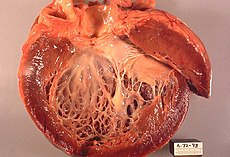
A person with cardiomyopathy may suffer an embolus before any other symptom of cardiomyopathy appears. That's why anti-clotting (anticoagulant) drug therapy may be needed. Arrhythmias may require antiarrhythmic drugs. Therapy for dilated cardiomyopathy is often aimed at treating the underlying cause, however. If the person is young and otherwise healthy, and if the disease gets worse, a heart transplant may be considered.
When cardiomyopathy results in a significantly enlarged heart, the mitral and tricuspid valves may not be able to close properly, resulting in murmurs. Blood pressure may increase because of increased sympathetic nerve activity. These nerves can also cause arteries to narrow. This mimics hypertensive heart disease (high blood pressure). That's why some people have high blood pressure readings. Because the blood pressure determines the heart's workload and oxygen needs, one treatment approach is to use vasodilators (drugs that "relax" the arteries). They lower blood pressure and thus the left ventricle's workload
No comments:
Post a Comment